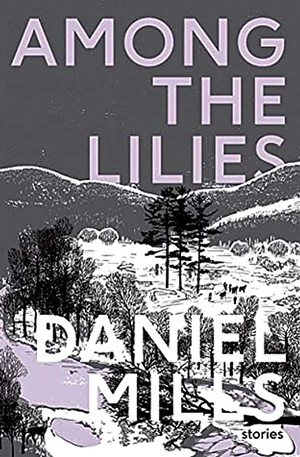Switch to the mobile version of this page.
Vermont's Independent Voice
- News
- Arts+Culture
- Home+Design
- Food
- Cannabis
- Music
- On Screen
- Events
- Jobs
- Obituaries
- Classifieds
- Personals
Browse News
Departments
Browse Arts + Culture
View All
local resources
Browse Food + Drink
View All
Browse Cannabis
View All
-
Business

Cannabis Company Could Lose License for Using…
-
Culture

'Cannasations' Podcaster Kris Brown Aims to 'Humanize'…
-
True 802

A Burlington Cannabis Shop Plans to Host…
-
Business

Judge Tosses Burlington Cannabiz Owner's Lawsuit
-
Health + Fitness

Vermont's Cannabis Nurse Hotline Answers Health Questions…
Browse Music
Browse On Screen
Browse Events
View All
Quick Links
Browse Classifieds
Browse Personals
-

If you're looking for "I Spys," dating or LTRs, this is your scene.
View Profiles
Special Reports
Pubs+More
Book Review: 'Among the Lilies,' by Daniel Mills
Published October 27, 2021 at 10:00 a.m. | Updated December 20, 2021 at 2:41 p.m.
In Daniel Mills' world, every town is a ghost town, and everyone in them is haunted. The places and characters in the Hinesburg author's new 12-story collection, Among the Lilies, are besieged by disturbances both mundane and supernatural. It's impossible to say which are more terrifying.
Past lovers linger, refusing to loosen their grip on the hearts and minds of their former partners. Immutable choices echo restlessly in memories. The stain of trauma lingers on hillsides, in baseboards and in the frozen New England dirt. There is no escape from turmoil. It's in the air, inhaled by the living and exhaled by the dead.
Mills describes his work, including the novels Moriah and Revenants, as Gothic fiction. His writing could also be called cerebral horror. He's also a local true-crime aficionado, as heard in his podcast, "These Dark Mountains."
Among the Lilies, published by Canadian press Undertow Publications, corrals two new works and 10 previously released pieces, some completely reworked, into a deeply affecting and sometimes horrifying volume. (Indeed, this reviewer endured nightmares after reading only the first two tales, "Below the Falls" and "The Woman in the Wood.")
Largely set in bygone eras, these stories burn slowly, flames figuratively licking the fingers as they turn the page. Mills writes with vivid detail and historical authenticity. His prose ranges from ornate to brusque, in parallel with certain qualities of Northeast life: lush and beautiful but also cold and stark.
In opener "Below the Falls," the narrator, presumably a 19th-century doctor, presents excerpts from a dead woman's diary. He — and seemingly Mills, too — primes readers to rethink what they know about ghost stories:
They are always the same. A respectable narrator visits a country house where he experiences a series of unsettling incidents before the final appearance of the ghost bursts on his mind like a thunderclap. His faith is shattered or his sanity. He is changed forever. But if the defining quality of a ghost is its mystery, its otherness, I propose to you we are surrounded by such spirits whether we acknowledge it or not.
In a script-like font, a troubled woman details a short period in her life before she is sent to a state psychiatric hospital. With little exposition, her alleged madness unfolds in a series of scenes iced over with familial dread and raging psychosis. The narrator is left to speculate about the factors that led to her committal.
In a similar fashion, "Lucilla Barton (1857-1880)" recounts a spate of mysterious deaths through official documents. Birth, marriage and death certificates, newspaper clippings, and court testimony describe the gruesome fates of a family, all seemingly haunted by malevolent forces.
"Lilies," a lengthier story from which the book takes its name, is an homage to the Gothic fiction Mills adores. Perfectly named central characters Henry Feathering and Clemency St. James discuss Emily Brontë and Edgar Allan Poe while falling into a romance as ill-fated as those in Wuthering Heights or "Annabel Lee."
Lonely Boston scrivener Henry has been summoned to the country by his reclusive uncle, Edward, his last living relation. The story takes place mostly in and around Edward's crumbling mansion, which has slowly decayed in the years after the death of his wife.
click to enlarge 

- Courtesy
- Among the Lilies by Daniel Mills, Undertow Publications, 260 pages, $19.99.
On the train ride to Edward's, Henry encounters enthralling Clemency, along with her persnickety brother, Justice, who are also traveling to see relatives. Henry and Clemency quickly fall in love and make plans to marry.
While walking the grounds of Edward's estate, which will transfer to Henry upon his uncle's death, the lovers discover the grave of Lily Stark, daughter of the house's original owner. Edward tells Henry she died by suicide.
"Her presence pervades this house, her agony," Edward tells Henry, warning him not to take up residence with his bride in the house after he's gone. When they ignore that advice, Henry and Clemency soon begin to feel a presence beyond their understanding.
Even bulkier is the final story in the collection, "The Account of David Stonehouse, Exile." The hardscrabble life of the title character is slowly explained through flashbacks that punctuate his lonely life in the woods.
On the brink of starvation after a harsh winter, David and his trusty hound, Judah, take refuge in an abandoned house in the woods. Plagued by memories and apparitions from his former life in a cultlike Church of Christ community, he struggles to keep himself together.
His history has a stranglehold on him, slowly driving him mad as the details of his current circumstances come to light for the reader. But danger lurks in the present, too.
Mills dazzles with his accounts of yesteryear, but his contemporary settings are just as ripe with chills. In "The Lake," a simple afternoon of swimming becomes a lifelong source of anxiety for a millennial teen. It recalls the ineffable dread of growing up in stories such as Stephen King's "The Body," perhaps better known in its film adaptation, Stand by Me. And "Dream Children," set in downtown Burlington and on the shores of Lake Champlain, is a neo-noir mystery with a skin-crawling climax.
Most petrifying is "The Woman in the Wood," a brutally graphic haunting. Mills is at his most visceral telling the story of a young farm boy who slowly surrenders to violent visions. Mills' descriptions of human and animal bodies — inside and out — are transfixing.
Mills serves up horror in ways that feel all too real. He finds the realities that live in our most irrational fears and contorts and augments them into pure panic.
From Among the Lilies: 'The Woman in the Wood'
My Uncle will not speak of his first wife.
This evening at supper, I mentioned I had visited her grave & read the words carved upon the stone. He did not respond but proceeded to cut his lamb into dry strips, the knife scraping on his plate. Mary slurped & suckled at her mother's breast.
I said: I do not understand. Was she never found?
Uncle Timothy set down his knife. His hands folded themselves into fists & I knew he was angry, though he is not one to show it.
He said: You saw her grave. You know as much as anyone.
And here he stood & stalked away from the table. My Aunt turned in her chair, as though to call him back & the babe's mouth slipped free of her breast, exposing the nipple, which was red & inflamed & with a dribble of milk hanging from it.
She was not embarrassed by this. She shifted the babe against her breast & covered herself with its mouth once more.
She said: Martha went to meet someone in the wood. Another man.
Oh, I said & was ashamed.
It's all right, she said. You weren't to know.
The original print version of this article was headlined "Ghost Writer"
Related Stories
Got something to say?
Send a letter to the editor
and we'll publish your feedback in print!
Tags: Books, Daniel Mills, Among the Lilies, Gothic fiction
More By This Author
About The Author

Jordan Adams
Bio:
Jordan Adams joined Seven Days as music editor in 2016. In 2021, he became an arts and culture staff writer. He's won awards from the Vermont Press Association and the New England Newspaper and Press Association. In 2022, he became a freelance contributor.
Jordan Adams joined Seven Days as music editor in 2016. In 2021, he became an arts and culture staff writer. He's won awards from the Vermont Press Association and the New England Newspaper and Press Association. In 2022, he became a freelance contributor.
Speaking of...
Comments
Comments are closed.
From 2014-2020, Seven Days allowed readers to comment on all stories posted on our website. While we've appreciated the suggestions and insights, right now Seven Days is prioritizing our core mission — producing high-quality, responsible local journalism — over moderating online debates between readers.
To criticize, correct or praise our reporting, please send us a letter to the editor or send us a tip. We’ll check it out and report the results.
Online comments may return when we have better tech tools for managing them. Thanks for reading.
- 1. Video: Plainfield Recovers From Catastrophic Flood Stuck in Vermont
- 2. Vermont’s Olympic Rowers Head to Paris Outdoors & Recreation
- 3. Vermont's Singular Sculpture on the Highway Project Gets a Facelift Art Review
- 4. Visiting Randolph, Vermont? What to See, Do and Eat on Your Trip Visiting Vemont
- 5. Vermont Comedy Club Chef Mo AlDoukhi Cracks Eggs and Jokes Grilling the Chef
- 6. The Magnificent 7: Must See, Must Do, July 24-30 Magnificent 7
- 7. Theater Review: 'The Prom,' Lost Nation Theater Theater
- 1. Three to Six Hours in Newport, Vermont’s North Coast Culture
- 2. Burlington’s Semipro Soccer Team, Vermont Green FC, Is Winning On and Off the Field Outdoors & Recreation
- 3. Vermont’s Olympic Rowers Head to Paris Outdoors & Recreation
- 4. Québec’s Powwow Season, a Summer Tradition, Kicks Off Québec Guide
- 5. Theater Review: 'The Beauty Queen of Leenane,' Dorset Theatre Festival Theater
- 6. Vermont Playwright and Musician Stephen Goldberg Dies Performing Arts
- 7. State Architectural Historian Devin Colman Steps Down — and Into a New Role Architecture









































